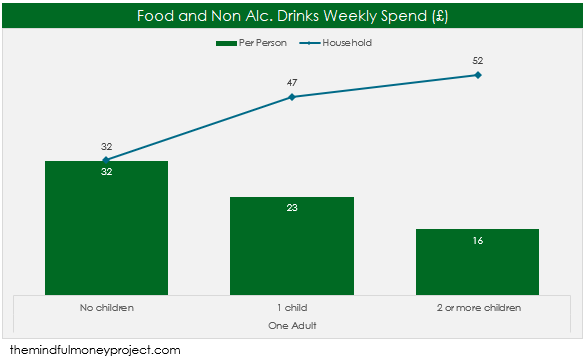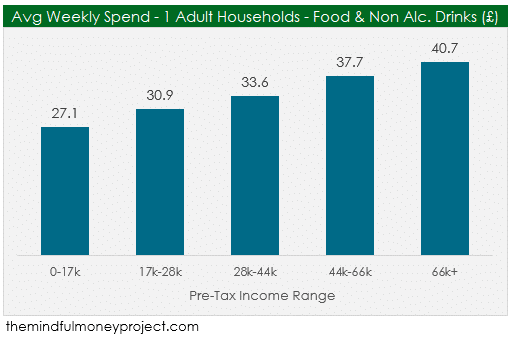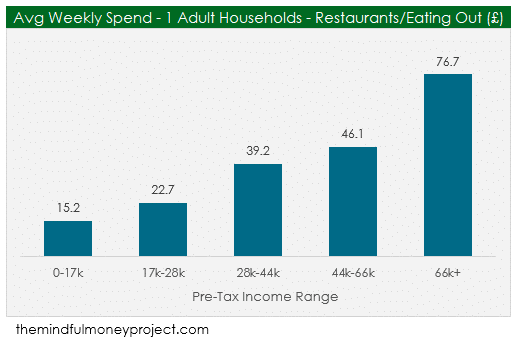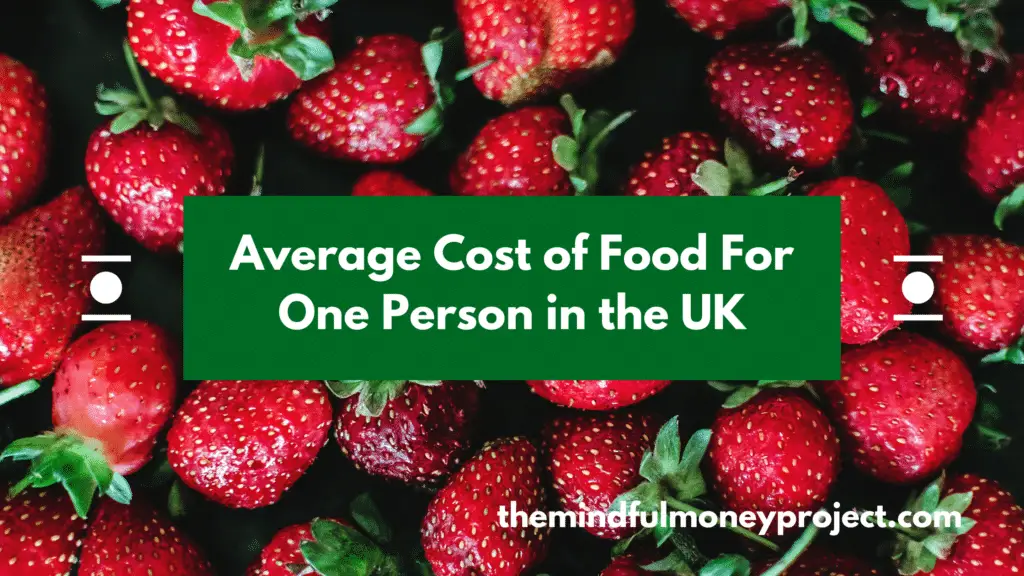When looking at your own food costs, it is often difficult to know how you’re doing. Are you living a decadent lifestyle or are your food costs in line with other people in a similar position to you? Many people ask the question: “how much should a single person spend on food in the UK?”. Fortunately for us, data is available. In this article, we’ll show you what the average cost of food for one person in the United Kingdom is.
Average Cost of Food For One Person in the UK
The average cost of grocery shopping for one person in the UK is £32 per week (£138.70 per month).
This increases to £47 per week with one child (£203.70 per month). And to £52 per week with two or more children (£225.3 per month). This is all excluding alcoholic drinks and any cost for eating out. So just food purchases and non-alcoholic drink purchases only (note this is for non-retired households, for retired households see here).

The Average Grocery Bill for One Person Differs Based on Income
As you would expect, people with higher incomes tend to spend more on their weekly grocery shop. All of the income ranges stated are pre-tax.
For single-person households (i.e with one adult), the average weekly groceries shop (excluding alcoholic drinks and eating out) is £27.10 per week for income bands £0-£17k, jumping to £40.70 per week for people with income over £66k per year. This is a ~50% increase in spending.

Average Cost of Eating Out Per Person in the UK
Even though focusing on just the cost of the weekly grocery shop is super useful, it doesn’t show us the full picture. A portion of weekly spend will be as a result of eating out. Whether that be in restaurants, cafes or takeaways.
In order to get a full picture of spending on food, we need to take this into account. Otherwise, you risk setting a budget which is too low!
The average cost of eating out at restaurants per person in the UK is £27.40 (£118.70 per month).
However, similarly to grocery spend, this varies massively based on income. Restaurant spend is one of the luxuries which can be cut when disposable income gets tight, and (if you’re anything like me), one of the nice luxuries that comes back when you have a bit more disposable income. So as income rises, you would intuitively expect more spend on this. This is borne out in the data we see from the ONS, with restaurant spend rising (significantly) as incomes rise.
For income ranges between £0-£17k per year (pre-tax), the average weekly spend is £15.20 (nearly 45% lower than the average), which is equivalent to £66 per month. This jumps to £39.20 per week (£170 per month) for the income range £28k-£44k (43% higher than average) and jumps further to £76.70 per week (£332 per month) for incomes above £66k (a whopping 180% above the average).

We have also done a longer and more comprehensive analysis for the average cost of food for an average UK household if you are looking for data not just about single adult households.
Source of data
The Office for National Statistics (ONS) conducts a large survey trying to understand consumer spending behaviours and expenditures. This helps the government to make decisions based on the multitude of data points it helps to bring in. However, they also publish these publicly, which allows us to analyse the results and help people like you.
These surveys happen throughout the year and therefore take into account any seasonality (for example higher grocery spend around christmas!). They are filled in by ~5000 households who track their grocery spending over a two week period. The clever statisticians at the ONS then crunch the data so it is suitable for analysis. They also helpfully provide the expenditure information across loads of different dimensions such as income, region, socio-economic status and household composition.
How to track your own food costs
If you’re here, then you’re likely wanting to first understand:
- how much you are spending on your food costs,
- how that compares to people like you and,
- how on earth you can help to reduce your spending.
For the first step, there are some personal finance apps designed to easily help you track your expenditure. They are so easy to use you now don’t really need to do too much.
Our favourites are Plum* and Snoop*.
Plum* even has a feature (called Diagnostic Reports) that matches you against similar users on their own database based on your salary, age and location. They’ll show how your spending compares against your “lookalikes” which you can use as a benchmark to see how you’re doing. This is huge. Even though the figures we’ve presented above are from a UK-wide survey of households, the information from Plum is based on a huge (and live) dataset of transactions. You can use this as a benchmark to figure out if your spending is “out of control” on certain categories (they also help to track other categories outside of food too).
If you’re looking for an app that tracks your spending, can help to save money automatically and provides useful insights such as these benchmarks, then Plum* is your go-to.
How to Reduce Your Spending on Food
As a single person buying food, it can be difficult following the normal advice. “Buy in bulk”…. “Cook in bulk”….. etc.
Unless you want to be eating the same meal every day of every week, it can be very difficult to implement some of this advice. Also with the current living cost crisis and food inflation pushing up all your living expenses without any control on your behalf, it is more important to stay on top of these food costs, which can take up a large portion of your after-tax income.
Instead, we’ve compiled a list of ways you can save money on your food when buying for one person. Not into your cooking? See these ways to save money on food without cooking (bet you hadn’t thought of some of these).
Meal boxes
Meal boxes like Gousto or HelloFresh may not be cheaper than making your own food, but if you find yourself throwing away lots of the food you buy because it goes off, then I highly recommend you look at these options. As they provide only the exact amount of food you need for the recipes, your food wastage should drop to near zero. This has the potential to save lots of money each and every week, even if you might be paying more than if you bought the equivalent from a supermarket and found a recipe elsewhere (which leads onto the next point…).
Let me be clear here. These meal boxes (Gousto/HelloFresh) work out more expensive per portion than if you just went out and did the shopping. But if you struggle with high levels of food wastage and/or are constantly uninspired on what to eat (and therefore get tempted with eating out or getting takeaways), then these services can help you to reduce your wastage and keep you from being tempted with takeaways and eating out.
Reduce food wastage
If you find yourself throwing away lots of food each week, you could be throwing money in the bin (literally).
Reducing this food wastage can have a massive impact on your weekly food shop. If you’re throwing away 20% of all the food you buy on a weekly basis then by cutting this out you can literally reduce your food costs by 20%. Some ways to reduce food wastage include:
- Meal box solutions (above)
- Plan ahead with recipes so you only buy what you need when shopping
- Buy only the amount you need for recipes
- Use a food waste app like Kitche to track food and reduce wastage
Swap down
For this tip, you literally don’t need to change anything to do with your lifestyle other than one thing. Your supermarket. If you currently shop in Sainsbury’s for example, try shopping in Asda or Tesco to see if it is cheaper for the equivalent. If you shop in Tesco already, try shopping in Aldi/Lidl. Even though Tesco/Sainsbury’s/Asda price match to Aldi/Lidl across a range of products, they don’t tend to be as competitive across the full range.
Similarly, if you always buy a named brand food item, try swapping down to the next level i.e a supermarket own brand version. Some options are worth paying more for, but I bet there are plenty of food items you won’t even notice you swapped. One thing you will notice – the improvement in the size of your wallet!
Conclusion: Average Cost of Food For One Person in the UK
With the current cost of living crisis and increasing food costs in the UK, it is important to stay across these costs. Sometimes though, it is difficult to understand how you’re doing compared to people similar to you. Are you just a really decadent spender? Or a spendthrift? Using a benchmark like average food cost is useful.
Using data from an ONS survey of UK households, the average weekly grocery shop for one person (excluding alcoholic drinks and eating out) is £32 per week (£138.70 per month). The average weekly restaurant spend is £27.40 per week (£118.70 per month) for one adult households too.
However, as you would expect, this spend changes based on factors such as whether you have a child and what your income is. People with higher incomes spend more on their weekly grocery shop and eating out.
We hope this has helped answer your question “how much should a single person spend on food UK?” by giving you a useful benchmark to compare yourself to. However, I would highly recommend the Plum* diagnostic reports feature to provide you a super personalised benchmark based on live transaction data across its user base (it matches you based on age, location and income).
This post may contain affiliate links (any links we earn commission on if you go on to make a purchase are marked with an * asterisk). These do not influence our editorial content and we remain independent.
What Is A Good Amount Of Savings UK?
Generally in life, more tends to be better. But is that true for savings? Whilst…
“Why Should I Track My Expenses?” – We’ve got 7 reasons why!
Tracking your expenses isn’t all about firing up a spreadsheet and restricting your spending. Having…
How To Cancel Graze Subscription UK
Bored of your Graze boxes or want to try a competitor’s version? We get you….
How To Cancel Hellofresh Subscription UK
Bored of the meal kits or want to try a competitor? We get you. We’ve…
How To Cancel Les Mills On Demand UK
Bored of your subscription or wanting to move to another provider? We get you. We’ve…
How To Cancel Laithwaites Wine Plan UK
Bored of the service or wanting to move to a different wine subscription club? We…








